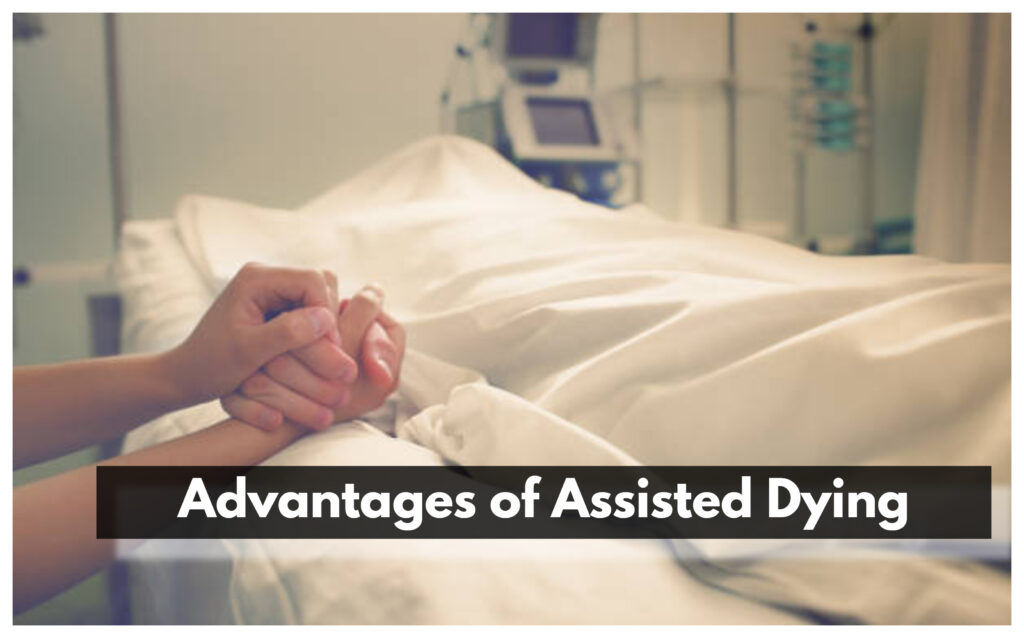The ethical dilemma of assisted dying has been a topic of debate for many years. Assisted dying is a term used to describe the practice of providing medical assistance to those who wish to terminate their own lives. This concept has raised significant ethical and legal questions and divided opinions.
Arguments of Assisted Dying
The debate on assisted dying delves deep into complex ethical considerations. It touches on the profound decisions regarding legalization and the comprehensive effects on society, healthcare providers, and individuals seeking this option. This post aims to dissect the ethical dilemmas and arguments surrounding assisted dying.
We will navigate the existing legal and ethical frameworks and contemplate the outcomes of legalizing this practice.
Prefer to listen rather than read?
Definition of Assisted Dying
Assisted dying is the practice of providing medical aid-in-dying to individuals who are terminally ill and suffering from physical or emotional pain that cannot be alleviated. The medical procedure typically involves a doctor prescribing a lethal dose of medication to the individual, which the individual can then take to end their life.
The medical process is intended to provide an alternative for individuals who wish to die with dignity, rather than enduring a prolonged and painful death. Assisted dying has raised ethical concerns, as it is seen as a violation of the right to life, a right that is universally accepted.

Types of Assisted Dying
Euthanasia
Euthanasia, or physician-assisted suicide, signifies the act of intentionally ending a life to alleviate suffering. With the individual’s consent, it offers a path to end terminal illness distress. The term derives from the Greek words “eu” (good) and “thanatos” (death), encapsulating the essence of a ‘good death’. You’re going to see many debates over the ethical stands of this action. Below are the different methods of physician-assisted suicide.
Voluntary
In the journey towards the end of life, voluntary euthanasia emerges as a path chosen by individuals facing terminal illnesses, who find themselves in a sea of unrelenting suffering. The key factor here is “free will.” Those who make the voluntary choice are able to think clearly or are not influenced by any substance.
Healthcare professionals stand as guardians of this process, ensuring that decisions are well-informed, voluntary, and carried out with the utmost safety. This practice weaves together the threads of personal dignity and autonomy, championing the right to honor one’s personal values and life choices. It reflects a deep commitment to respecting individual wishes, anchoring in the ethical bedrock of self-determination and dignity.
Non-Voluntary
The ethical standards of Euthanasia is blurred when you’re going through non-voluntary means. This option is where the patient cannot make the decision to die, which means the family or the medical staff are the ones to make it. We should note how heavy the decision is when it comes to a person’s life, regardless of their background.
You’re going to factor in the worth of a life and morality of the decision since this practice threads a fine line between mercy and murder. In the end, it’s all about finding the right method that will benefit the patient.
Involuntary
Involuntary euthanasia starkly contrasts with the ethical principles underpinning healthcare and human rights. It involves ending a life without consent, directly opposing the core values of autonomy and respect for human life. Such actions are not only unethical but are also illegal across many jurisdictions, infringing on both civil and criminal statutes. The medical community, legal bodies, and human rights organizations unanimously condemn this practice. It’s crucial to understand the gravity of involuntary euthanasia’s moral and legal repercussions, emphasizing the universal stance that it should never be performed.
Assisted Suicide
Assisted suicide, or physician-assisted dying, introduces a nuanced option for individuals facing terminal illness. It involves a person receiving lethal medication from a healthcare provider, which they can self-administer to end their life peacefully and with dignity. This process hinges on the patient’s explicit consent, showcasing a profound respect for individual autonomy and decision-making.
Because the word “suicide” is a part of this option, you’re tackling a decision full of emotional and ethical difficulties. Every individual deserve compassionate support in any form, including continued medical support. Of course, “ending one’s self” is a form of compassion if they are continuously burdened by pain and mental anguish.
Pros and Cons of Assisted Dying
The conversation around assisted dying is multifaceted, touching on deeply personal, ethical, and societal levels. Here are some advantages often cited in support of assisted dying, presented in a way that aims to resonate with the human aspects of this complex issue:

Advantages
While the topic is surrounded by much controversy, there are some clear advantages to assisted dying that should not be overlooked.
- Empowers Individuals: Assisted dying grants people the autonomy to make significant decisions about their own lives and deaths, especially when faced with terminal illnesses. There is empowerment when a person has full control over their death.
- Alleviates Suffering: For many, the primary benefit of assisted dying is its capacity to relieve unbearable physical and emotional suffering. A patient can finally find peace from endless pain and suffering due to their severe condition.
- Enhances Quality of Life: Paradoxically, the option of assisted dying can improve the quality of one’s remaining life. We’re hit with incredible relief in knowing there is an end to our suffering, helping us enjoy life despite the suffering.
- Promotes Honest Discussions: The legalization and acceptance of assisted dying encourage open conversations about death and dying, which are often considered taboo. When all options are laid on the table, the patient can be free to talk their mind of how the last moment of their life will happen.
- Respects Human Dignity: Assisted dying upholds the principle that individuals should be able to end their life with dignity, rather than enduring a prolonged, undignified death. You’re still caring for the patient’s quality of life when opting to end their suffering.
- Prevents Tragic Alternatives: When legal options for assisted dying are unavailable, individuals may resort to more tragic or violent means to end their suffering. Legalization provides a safe, regulated, and humane alternative.
- Can Provide Closure: For both the individuals considering assisted dying and their families, the process can offer a sense of closure. It allows for the opportunity to say goodbye, settle affairs, and ensure that their passing is on their own terms.
- Resource Allocation: Though a more pragmatic than humanistic advantage, assisted dying can lead to more efficient use of medical resources, allowing healthcare systems to focus on patients with curable conditions and improving overall care quality.
Disadvantages
- Ethical and Moral Concerns: We’re going straight to the point. Assisted suicide is the unnatural ending of one’s life. The option is a contradiction among health providers’ mission of helping patients.
- Potential for Abuse: We’re walking on a thin line between mercy and murder when it comes to assisted suicide. There is always a chance of abuse if assisted suicide is freely given without much consideration.
- Slippery Slope Argument: If we are comfortable with ending a life, can we still give the same effort to improving other’s mental or physical health? The slippery slope conundrum comes down to the value of one’s life being degraded to the pain they are facing. Should it be easy to offer an escape instead of a treatment?
- Impact on Families and Society: Assisted dying can have profound emotional impacts on families, leading to guilt, grief, and complex moral dilemmas. On a larger scale, it might alter societal views on aging, disability, and the value of life under certain conditions.
- Complicates the Doctor-Patient Relationship: Introducing assisted dying into medical practice could strain the traditional healing role of physicians, complicating the trust and dynamic between doctors and their patients.
- Choosing the Easy Option: Palliative care is a special form of medical care for major conditions. Because of the assisted suicide option, families or patients might be inclined to think about receiving palliative care.
- Religious Challenges: Suicide is taboo to many religions and cultures due to its belief in the importance of life. A patient’s belief could contradict the decision to choose euthanasia, which makes non-voluntary or involuntary decisions nearly impossible.
- Regulatory and Legal Challenges: Crafting and enforcing laws that adequately protect the vulnerable while allowing genuine cases of unbearable suffering to access assisted dying poses significant legal challenges. The risk of litigation and the complexity of regulations can deter physicians from participating.
- Emotional Toll on Healthcare Providers: Assisting in the death of a patient can carry a heavy emotional burden for healthcare providers, potentially leading to moral distress, ethical dilemmas, and burnout.
- Possible Undermining of Suicide Prevention Efforts: There is a concern that legitimizing assisted dying could inadvertently weaken societal efforts to prevent suicide, sending mixed messages about the value of seeking help in times of despair.
International Laws Around Assisted Dying
As societies evolve, so do their laws, particularly those governing the most personal aspects of life, including the right to die. Assisted dying, a topic of profound ethical, moral, and legal debate, varies significantly across the globe. Countries navigate the delicate balance between honoring individual autonomy and protecting vulnerable populations, resulting in a diverse array of legislation. This section explores the international landscape of assisted dying laws, highlighting how different countries address this complex issue.
New Zealand: A Pioneer with the End of Life Choice Act
In 2019, New Zealand distinguished itself by enacting the End of Life Choice Act, marking a significant step in the global dialogue on assisted dying. New Zealanders suffering from terminal illness and are expected to die within six months can opt for assisted dying. Only people living permanently in the country can choose the option of medical suicide.
Candidates must demonstrate clear understanding and intent, undergoing assessment by two independent doctors. One of the health practitioners may be a psychiatrist if mental health concerns are present. This Act embodies New Zealand’s commitment to providing individuals with the autonomy to end their life on their own terms, within a framework designed to ensure informed consent and to prevent coercion.
United States: A Mosaic of State Laws
In the United States, the question of assisted dying is addressed at the state level, leading to a patchwork of regulations States that allowed medical suicide include Oregon, California, Colorado, Vermont, and Washington.
These laws typically require confirmation of the terminal diagnosis by multiple healthcare providers and stipulate that the individual must be capable of making and communicating their healthcare decisions. Therefore, non-voluntary and involuntary medical suicide is not allowed by state law. In fact, the five mentioned states made involuntary Euthanasia illegal as shown by the Montana Supreme Court’s ruling for the Baxter v. Montana.

Europe: Diverse Approaches
Europe presents a spectrum of regulations surrounding assisted dying, with countries like Belgium, the Netherlands, and Luxembourg permitting euthanasia and assisted suicide under strict conditions. These nations have developed comprehensive frameworks to regulate the process, including thorough review boards that evaluate each case to ensure compliance with legal requirements.
Safeguards and Ethical Considerations
Across the globe, countries that have legalized assisted dying have instituted robust safeguards to protect vulnerable individuals. These measures often include strict eligibility criteria, mandatory waiting periods, and the requirement for approvals by multiple healthcare professionals. The goal is to ensure that the decision for assisted dying is made freely and informedly, without external pressure or coercion, reflecting a balance between individual rights and societal responsibility.
The international legal landscape of assisted dying reveals a complex tapestry of ethical considerations, cultural values, and legal principles. As countries grapple with these issues, the evolving laws reflect a continuous effort to honor individual autonomy while safeguarding the integrity and dignity of life.
Religious Perspectives on Assisted Dying
Delving into the realm of assisted dying unveils not just legal and ethical landscapes but also deeply rooted religious sentiments. Each faith, with its unique teachings and traditions, casts a different light on this complex topic. Here’s a closer look at how various religions grapple with the nuances of assisted dying, revealing a mosaic of beliefs that guide followers in confronting this delicate issue.
Christianity’s Varied Voices
Within the broad canopy of Christianity, attitudes towards assisted dying are as varied as the denominations themselves. The Catholic Church stands firmly against it, framing life as a sacred gift that shouldn’t be prematurely ended by human hands. Many Protestant branches echo this sentiment, highlighting moral reservations. Yet, there’s an ongoing conversation among Christians that weighs compassion and the relief from suffering against traditional doctrines, suggesting that views on end-of-life care are evolving.
Islam: A Firm Stand for Life’s Sanctity
Islam values life as a precious trust bestowed by Allah, casting assisted dying in a prohibitive light. The teachings encourage patience and finding strength in faith during hardship. The concept of Qadar, or divine predestination, reinforces the belief that one’s lifespan is divinely determined, guiding Muslims to accept life’s trials as part of their spiritual journey.
Judaism: Balancing Life Preservation and Suffering
Judaism holds life as an invaluable treasure, advocating for its preservation through the principle of “pikuach nefesh.” This ethos generally places assisted dying outside the bounds of Jewish law. Yet, the tradition is rich with debates over the ethical nuances of pain, the extension of life through medical intervention, and the dignity of the dying, reflecting a thoughtful engagement with end-of-life ethics.
Buddhism: The Middle Path of Compassion
In Buddhism, compassion and the desire to alleviate suffering are paramount, yet there’s no monolithic stance on assisted dying. The principle of karma invites careful consideration of one’s actions and their consequences. For some Buddhists, assisting in ending unbearable suffering, when done with compassionate intent, can be morally justifiable. Others advocate for acceptance and the natural course of life, emphasizing the importance of the intentions behind our actions.

Hinduism: The Cycle of Life and Duty
Hinduism’s perspective is informed by the concepts of karma and dharma, underscoring the sanctity of life within the endless cycle of birth, death, and rebirth. While the faith traditionally opposes taking life, it also acknowledges the imperative to alleviate suffering. This creates a space for varied interpretations of assisted dying, woven through with the threads of duty, compassion, and the cosmic laws that govern existence.
A Tapestry of Beliefs
The religious tapestry surrounding assisted dying is intricate, with each faith bringing its own colors and textures to the discussion. These spiritual perspectives deeply influence the moral and ethical considerations surrounding the issue, painting a picture of humanity’s diverse and nuanced approach to life’s final chapter.
Society’s Views and Opinions on Assisted Dying
Society’s views and opinions on assisted dying remain varied and complex. A wide range of ethical and moral considerations come into play. Some feel that an individual’s right to make this deeply personal decision should be respected. While others may oppose assisted death on the grounds that it is a form of suicide and should not be allowed under any circumstances.
There are also those who support the idea of assisted dying, but only under certain circumstances, such as when the patient is suffering from a terminal illness or when the patient is in an advanced state of physical deterioration and/or in a state of unbearable pain.
This support is typically based on the idea that, in such circumstances, the patient should have the right to choose to die with dignity and to be able to do what they can to lessen their suffering. In addition, it is argued that allowing this option can help alleviate the emotional and financial burden often placed upon the families and friends of terminally ill patients, who may find themselves unable to cope with the inevitable outcome.
Even amongst those who support the concept of assisted dying, there may be divergent opinions on the appropriate regulations and restrictions that should be applied to limit its use. The debate surrounding the issue of assisted dying is likely to remain contentious for many years to come.
It is important for society to approach this subject with an open mind and with respect for the diversity of opinions expressed. However, it is important to understand the ethical implications of both sides of the argument before making a decision.
Conclusion
In conclusion, the ethical dilemma of assisted dying is complex and challenging. It is important to consider not just the individual’s autonomy and right to end their suffering, but also the wider implications of allowing assisted dying.
This includes examining the potential for abuse or the risk of slipping into a slippery slope of euthanasia, where the rights of those who are vulnerable could be compromised. Furthermore, the implications of assisted death on a cultural level must also be considered.
Different religious and cultural beliefs have traditionally been opposed to the idea of assisted death, and it is important to take these into account when debating the issue. This issue is one that requires further discussion and debate in order to ensure that everyone’s rights are respected and that a decision is made.
What about you? What are your views on assisted dying? if you like this topic, you may also like our article on Early Diagnosis: Understanding the Signs of Dementia.



